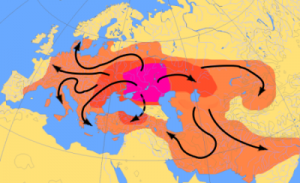Story on NPR today about Li Yang (李阳), the originator of the unusual language learning method called Crazy English. It’s a method that’s enjoyed considerable popularity in China and involves shouting out English, either alone or, preferably in a group (the normal Chinese way to do things). His main motto is “To shout out loud, you learn”. Another of his sayings is “I enjoy losing face” – pointing to the need for Chinese English leaners to overcome their shyness and fear of making mistakes. It’s not a method that differs very much from the traditional learning techniques in China, namely repetition and memorization. According to Wikipedia, there are some 20 million practitioners of Crazy English. The New Yorker had an interesting article about the method just before the 2008 Olympics, as it was being widely used in China in preparation for the Games. There’s also a 1999 documentary entitled Crazy English by Zhang Yuan (张元).
However, he was not in the news today because of Crazy English, but because his (American-born) wife has successfully obtained a restraining order, a first in China. It seems that Li Yang not only shouts, but hits as well. In fact, his wife was beaten so badly that in desperation she posted a picture of her face on Weibo (the Chinese version of Twitter) under the heading, “I love losing face = I love hitting my wife’s face?”. This kind of public acknowledgement of what happens within a family is highly unusual in China, and the message went viral and has led to more pubic discussion of domestic violence.
The wife, Kim Lee, is using her own story to try to raise awareness. According to the NPR story, “Now, she wants to use her high profile to help others. She is particularly concerned about one woman, Li Yan, who is facing the death penalty after murdering her husband. She suffered years of abuse, during which her husband even hacked off one of her fingers. She went to the police, but they didn’t intervene….Beyond that case, there’s still much to do: China still doesn’t have a specific law forbidding domestic violence.”
You can watch the entire documentary from Youku, it’s in Chinese, but with English subtitles => Crazy English












